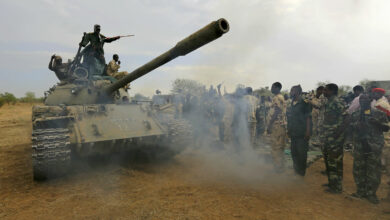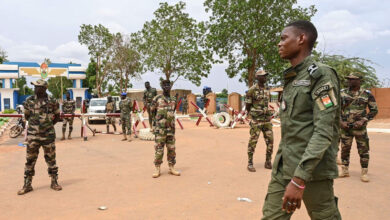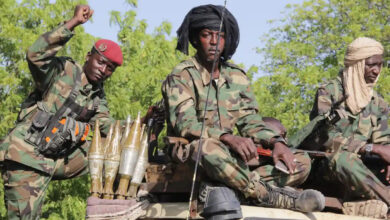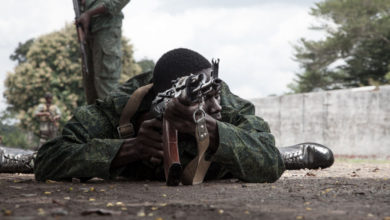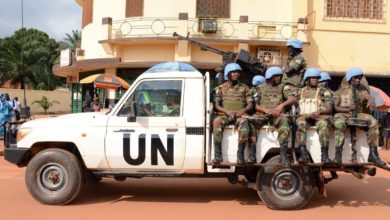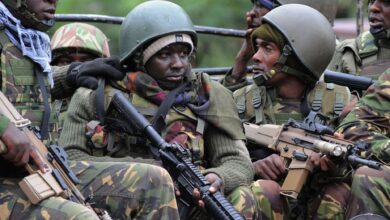The government of the Central African Republic and 14 armed groups on Tuesday, February 5 took a further step towards signing a new peace accord.
The accord, which was agreed on February 2, was initialed by President Faustin Archange Touadera and representatives of militias which control most of the chronically-troubled country.
It will be signed in Central African Republic capital Bangui “in the coming days,” Touadera’s office said, without announcing a date.
The text of the agreement has not yet been made public, and there was no word on what compromises may have been needed to achieve it.
“The contents will be made public after the signature,” the head of the government delegation, Firmin Ngrebada, said.
After the deal was announced on Saturday, Aboubakar Sidik, spokesperson for one of the main armed factions, the Popular Front for the Renaissance of Central African Republic (FPRC) said “a consensus has been reached on sticking points which were an amnesty and an inclusive government.”
A sticking point in the negotiations has been amnesty for armed groups.
In August, the Facilitation Panel of the African Initiative of the African Union met with armed groups, where they agreed 104 demands later presented to the government. Five issues were “put to one side” at the time, including the demand for a general amnesty. Five human rights organizations united in opposition to an amnesty.
Under Western pressure, CAR’s government has always refused pardons for warlords, several of whom are under U.N. sanctions or cited for human rights violations in U.N. reports.
“The Khartoum Agreement opens the door for peace to return to our homeland,” Touadera declared at the ceremony. “It is now time to open a new page for Central Africa. Let’s go together to Bangui to build our country together.”
Sudanese President Omar al-Bashir said his country was delighted to have hosted the talks and vowed to “continue to be a partner” in peace efforts.
After the agreement was initialed, representatives of the armed groups shook hands with Touadera and Bashir.
Speaking on behalf of the armed groups,Herbert Gontran Djono Ahaba, who has ties to the ex-Seleka RPRC, said: “The difficult time starts now, and that is implementing the Khartoum Agreement … This agreement is crucial for peace.”
Peace and reconciliation in CAR
Brokered by the African Union, the African Initiative for Peace and Reconciliation in the Central African Republic Inter-Central African Dialogue between Government and Armed Groups began on January 24 after 18 months of exploratory work.
It is the the eighth bid in six years to agree a lasting peace. The last attempt, in 2017, was forged with the help of the Catholic Church, but fighting resumed within a day, leaving 100 dead.
Humanitarian organizations have stressed the importance of the talks for CAR’s population. Violence since 2012 led to thousands of deaths. Nearly 700,000 people are displaced, 570,000 have fled the country and 2.9 million – 63 per cent of the population – are in need of humanitarian aid, according to the U.N.
Despite reserves of diamonds, gold, uranium, copper and iron, Central African Republic remains one of the world’s poorest countries.
Fighting broke out between the Seleka, a coalition of mainly Muslim rebel groups, and the mainly Christian anti-balaka militia in 2012. A peace deal was signed in January 2013, but Seleka rebels captured the capital Bangui that March and ousted President Francois Bozize.
Seleka was officially disbanded within months, but many fighters refused to disarm, becoming known as ex-Seleka. Many others joined the anti-balaka militia to fight the Seleka, leading to a spiral of violence between groups along religious and ethnic lines.
By the end of 2014, CAR was de facto partitioned – anti-balaka in the southwest and ex-Seleka in the northeast.
Elected in 2016, President Faustin-Archange Touadera’s weak government controls around a fifth of the country and relies heavily on the U.N. peacekeeping mission, Minusca, for support. The rest is controlled by at least 14 different militia groups who often fight each other for revenue from extortion, roadblocks or mineral resources.
A Special Criminal Court has been set up to decide cases of serious rights violations committed in the country since 2003.
With reporting from AFP



